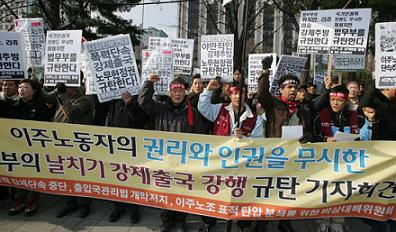ILO Calls for an End to Repression of Korean Migrants Union
Posted to the IUF website 20-Apr-2009Share this article.

Unions rally against the 2007 arrest and deportation of Korean Migrants Trade Union leaders. The ILO has now strongly affirmed the trade union rights of all migrant workers regardless of their legal status.
In a decision involving repression against the Korean Migrants Trade Union, the Governing Body of the ILO has strongly affirmed the rights of all migrant workers to form trade unions without fear of arrests and deportations stemming from their union membership or activity. The Governing Body, at its recent session, adopted a report by the Committee on Freedom of Association issued in response to a complaint submitted by the ITUC and the Korean national center KCTU in December 2007. (The decision is available here on the ILO website in English, French and Spanish).
The MTU was founded in 2005 to fight discrimination, workplace abuses and anti-immigrant government policies directed against Korea's estimated 400,000 migrants. The government responded to the union's application to register the organization with the Labour Ministry by announcing that migrants had no right to union recognition, organization, collective bargaining or protection under South Korean law, and that it would therefore reject the registration application. In February 2007, the Seoul High Court ruled that these rights were protected by the country's constitution and that the government should legally recognize the union. The Ministry of Labour appealed to the Supreme Court, where the case is still pending. Meanwhile, migrants were subjected to escalating police sweeps and deportations, including MTU leaders (in December 2007 and again in May 2008). Despite these attacks, the MTU continues its union work and bold defense of the rights of migrant workers.
While moving cautiously around the ongoing registration issue because of its ongoing status at the Supreme Court, the Committee nevertheless declared its intention to treat the issue at its next session in November this year - without necessarily waiting for the Supreme Court procedure to be completed. The Committee decision rejected "�the Government�s arguments that irregular migrant workers are not entitled to freedom of association and collective bargaining rights; their right to establish a trade union depends on their residence status and the existence of a lawful employment relationship which is not possible in their case.
The Committee recalled "in this regard the general principle according to which all workers, without distinction whatsoever, including without discrimination in regard to occupation, should have the right to establish and join organizations of their own choosing. The Committee further recalls that when examining legislation that denies the right to organize to migrant workers in an irregular situation - a situation maintained de facto in (the MTU) case - it has emphasized that all workers, with the sole exception of the armed forces and the police, are covered by Convention No. 87, and it therefore requests the Government to take the terms of Article 2 of Convention No. 87 into account in the legislation in question. The Committee also recalls the resolution concerning a fair deal for migrant workers in a global economy adopted by the ILO Conference at its 92nd Session (2004) according to which "[a]ll migrant workers also benefit from the protection offered by the ILO Declaration on the Fundamental Principles and Rights at Work and its follow-up (1998). In addition, the eight core ILO Conventions regarding freedom of association and the right to bargain collectively, non-discrimination in employment and occupation, the prohibition of forced labour and the elimination of child labour, cover all migrant workers, regardless of status."
In its recommendations, the Committee called on the government "to avoid in the future measures which involve a risk of serious interference with trade union activities such as the arrest and deportation of trade union leaders shortly after their election to trade union office and while legal appeals are pending."
In February 2007, when the Seoul High Court declared illegal the government's rejection of the union's notification of their establishment, we wrote: "It has taken nearly two years for a Korean court to determine that migrant workers are, in fact, workers, and workers with rights." On March 25, the ILO firmly reiterated the rights of migrant workers within the established framework of international labour rights and Conventions. Unions everywhere can and should build on this foundation.
